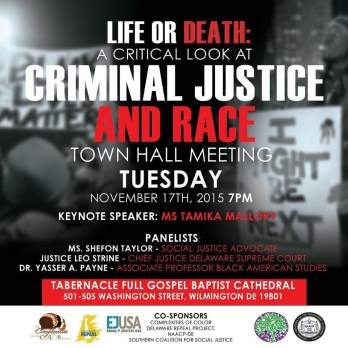The Delaware House of Representatives sent out an email on January 30, 2020, describing some members’ latest plan to attempt to reinstate the death penalty. The new bill, called The Egregious Crimes Accountability Act, claims to resolve the flaws that caused the Delaware Supreme Court to declare the death penalty statute unconstitutional in 2016. It also claims to “streamline” aggravating factors.
Do not be fooled. The image of the statue of blind justice that heads the video accompanying the email is a slap in the face to anyone who cares about racial justice. The new bill has made no attempt to change the extreme racial bias in the administration of the death penalty in Delaware. Indeed, some of these same legislators, in a 2016 letter responding to the death penalty being declared unconstitutional, stated that “We realize there are lingering questions about the equity of its application, but that is a separate issue.” It is not a separate issue to those who are likely to be caught in its snare or to any of us who care about the issues of equality before the law. In addition to racial bias, the new bill does nothing to correct for flaws related to wasteful spending, risk of executing an innocent, harm to victims’ family members, ineffectiveness, and failure to improve either public safety or the safety of law enforcement officers.
We urge you to contact your state legislators and urge them to oppose any efforts to reinstate Delaware’s death penalty. For talking points, click here. To find your legislators, go to Who Is My Legislator? at the top right of the Delaware General Assembly website and enter your address. Thank you!




